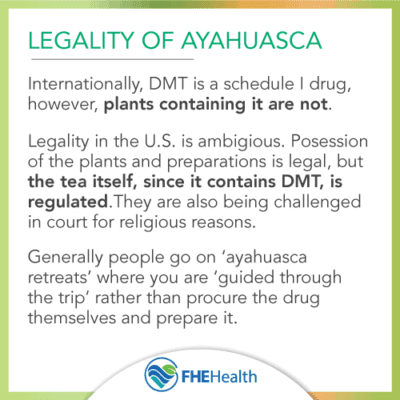Facing Legal Trouble for Ayahuasca Use in Hawaii: An Explainer
Hawaii, with its lush landscapes and vibrant culture, has long attracted those seeking spiritual growth and alternative healing practices. Among these practices is the use of Ayahuasca, a powerful psychedelic brew derived from plants native to the Amazon rainforest. However, the legality of Ayahuasca use in Hawaii is complex and can lead to significant legal trouble. This article provides a comprehensive overview of the legal landscape, potential risks, and important considerations for anyone contemplating or currently involved with Ayahuasca in the Aloha State.
The Legal Status of Ayahuasca in Hawaii
The primary issue regarding Ayahuasca use in Hawaii boils down to the ingredients. While the brew itself is not explicitly mentioned in Hawaiian law, its components are heavily regulated.
- DMT (Dimethyltryptamine): The psychoactive compound in Ayahuasca is a Schedule I controlled substance under both federal and Hawaii state law. This means it’s considered to have a high potential for abuse and no currently accepted medical use.
- Ayahuasca Vine (Banisteriopsis caapi): While the vine itself isn’t a controlled substance, possession with intent to manufacture Ayahuasca could be viewed as attempting to create an illegal drug.
- Other Ingredients: Other plants used in Ayahuasca preparations, while not illegal on their own, could be problematic depending on their chemical makeup and intended use.
Because of the presence of DMT, the possession, manufacture, and distribution of Ayahuasca are generally illegal in Hawaii. Law enforcement can and does prosecute individuals involved with the substance.
Potential Legal Consequences of Ayahuasca Use
Facing legal trouble in Hawaii for Ayahuasca use can have serious consequences, including:
- Criminal Charges: Depending on the quantity of Ayahuasca involved and the intent (personal use vs. distribution), individuals could face charges ranging from misdemeanor possession to felony manufacturing or distribution.
- Fines and Jail Time: Penalties vary depending on the charges, but could include significant fines and lengthy jail sentences.
- Criminal Record: A drug-related conviction can impact employment opportunities, travel, and other aspects of life.
- Asset Forfeiture: Law enforcement may seize assets believed to be connected to drug-related activities.
Exceptions and Gray Areas
While the legal landscape is generally unfavorable, some nuances and potential exceptions exist:
- Religious Exemption (Unlikely): Some individuals may argue for a religious exemption under the Religious Freedom Restoration Act. However, this is a complex legal argument, and success is far from guaranteed. The burden of proof rests on the individual to demonstrate that Ayahuasca use is a central tenet of their sincerely held religious belief.
- Federal Law (Potential for Conflict): Federal law is supreme. Despite state laws, federal law enforcement can prosecute individuals for violations related to Ayahuasca, potentially adding another layer of legal risk.
- Limited Research (Potential Future): There are ongoing research efforts exploring the therapeutic potential of psychedelics, including DMT. However, any future changes in the legal status of Ayahuasca would likely be dependent on federal approval and state legislation.
Minimizing Risk: What You Can Do
If you are considering or currently involved with Ayahuasca in Hawaii, it is crucial to understand and mitigate your legal risk:
- Consult with a Legal Professional: Seek legal advice from an attorney specializing in drug-related offenses and the legal complexities surrounding psychedelics in Hawaii. They can provide tailored guidance based on your situation.
- Exercise Extreme Caution: Understand that the legal risks are significant. Avoid possessing, manufacturing, or distributing Ayahuasca.
- Understand the Risks: Be aware of the potential for legal consequences before engaging in any activities involving Ayahuasca.
- Document Everything: If you are pursuing a religious exemption, meticulously document your religious practice and the role of Ayahuasca within it.
Frequently Asked Questions (FAQs)
1. Is it legal to grow the Ayahuasca vine in Hawaii?
While the vine itself isn’t illegal to grow, the intent to manufacture Ayahuasca could be interpreted as an attempt to produce a controlled substance (DMT). This could attract legal attention.
2. Can I bring Ayahuasca into Hawaii from another country?
No. Bringing Ayahuasca into Hawaii from another country is illegal and can result in severe legal consequences.
3. Are there any licensed therapists or healers in Hawaii who offer Ayahuasca ceremonies legally?
No. Due to the legal status of DMT, there are no licensed therapists or healers legally offering Ayahuasca ceremonies in Hawaii. Be extremely cautious of anyone claiming to do so.
4. What are the potential sentences for possession of Ayahuasca in Hawaii?
Penalties vary depending on the quantity, but possession can result in fines, jail time, and a criminal record. The exact penalties depend on the specific charges and the judge’s discretion.
Conclusion
The legal landscape surrounding Ayahuasca use in Hawaii is challenging. While some may be drawn to its potential benefits, it’s critical to recognize the significant legal risks involved. Understanding the laws, potential consequences, and available resources is essential for making informed decisions and minimizing the possibility of legal trouble. Consulting with a qualified attorney is the best course of action for anyone considering or involved with Ayahuasca in Hawaii.




